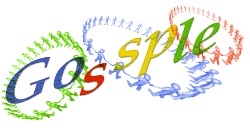Friday 18 November, 9:00-12:30, Salle Métivier (C024)
INRIA Rennes/IRISA, Université de Rennes 1
Presentation
The ASAP (As Scalable As Possible) research team from INRIA Rennes/IRISA organises a mini-workshop on recent advances on robustness and privacy in modern distributed systems. The talks range from diagnosis in very large IP infrastructures (Richard D. Schlichting, AT&T), and privacy mechanisms in large-scale networks (Pascal Felber, Université de Neuchâtel), through to adaptive dependability (Jean-Charles Fabre, LAAS-CNRS), and the generalisation of state-machine replication (Rachid Guerraoui, EPFL).
The workshop is open to all and free of charge. Please contact Francois Taiani for any query.
Programme
9h00-9h20 Coffee
9h20-9h25 Introduction and welcome
9h25-10h05 “Diagnosis in Practice”
Richard D. Schlichting, AT&T Labs, Florham Park, NJ, USA
Abstract: As a tier-1 ISP and telecom company, AT&T operates many services that form critical components of societal infrastructure, ranging from mobile phone networks to enterprise VPN services to an IP backbone that spans the globe. Ensuring the dependability of such services in a 24 by 7 operational setting is a daunting task, especially given their scale and inherent complexity. This talk will focus on work at AT&T that attempts to address the diagnosis aspect of the dependability equation in a variety of scenarios. Examples will be drawn from operational AT&T services, from the domain of network management, and from experimental techniques under development for VOIP services.
10h05-10h45 “Whisper: Middleware for Confidential Communication in Large-Scale Networks”
Pascal Felber, Université de Neuchâtel, Neuchâtel, Switzerland
Abstract: A wide range of distributed applications requires some form of confidential communication between groups of users. In particular, the messages exchanged between the users and the identity of group members should not be visible to external observers. Classical approaches to confidential group communication rely upon centralized servers, which limit scalability and represent single points of failure. In this presentation, we present Whisper, a fully decentralized middleware that supports confidential communications within groups of nodes in large-scale systems. It builds upon a peer sampling service that takes into account network limitations such as NAT and firewalls. Whisper implements confidentiality in two ways: it protects the content of messages exchanged between the members of a group, and it keeps the group memberships secret to external observers. Using multi-hops paths allows these guarantees to hold even if attackers can observe the link between two nodes, or be used as content relays for NAT bypassing. Evaluation in real-world settings indicates that the price of confidentiality remains reasonable in terms of network load and processing costs.
10h45-11h10 Coffe break
11h10-11h50 “Architecting Resilient Computing Systems: Overall Approach and Open Issues”
Jean-Charles Fabre, LAAS-CNRS, Toulouse, France
Abstract: Resilient systems are expected to continuously provide trustworthy services despite changes in the environment or in the requirements they must comply with. In this presentation, we focus on a methodology to provide adaptation mechanisms meant to ensure dependability while coping with various modifications of applications and system context. To this aim, we propose a representation of dependability-related attributes that may evolve during the system’s lifecycle, and show why this representation is useful to provide adaptation of dependability mechanisms at runtime.
11h50-12h30 “Generalizing Universaility”
Rachid Guerraoui, Ecole Polytechnique Federale de Lausanne (EPFL), Lausanne, Switzerland
Abstract: Replicated state machine is a fundamental computing construct for it essentially makes a distributed system emulate a, highly available, centralized one using a consensus abstraction through which processes agree on common decisions. Any sequential object is modeled by a state machine that can be replicated over all processes of the system and accessed in a wait-free manner: we talk about the universality of the construct and of its underlying consensus abstraction. Yet, consensus is just a special case of a more general abstraction, k-set consensus, where processes agree on at most k different decisions. It is natural to ask whether there exists a generalization of state machine replication with k-set agreement, for otherwise distributed computing would not deserve the aura of having an underpinning Theory as 1 (k-set consensus with k=1) would be special. The talk will recall the classical state machine replication construct and show how, using k-set consensus as an underlying abstraction, the construct can be generalized to implement k state machines of which at least one makes progress, generalizing in a precise sense the very notion of consensus universality. (Joint work with Eli Gafni, UCLA)

